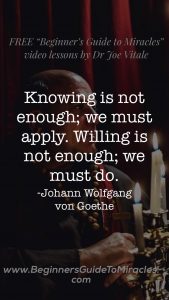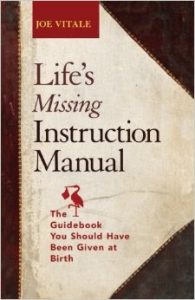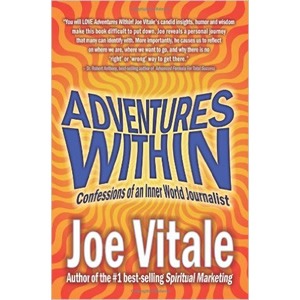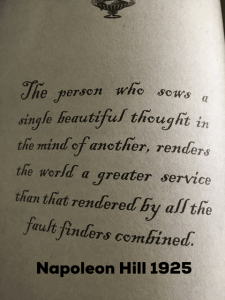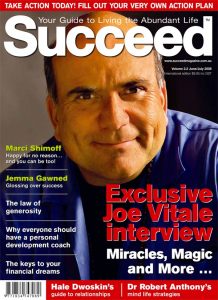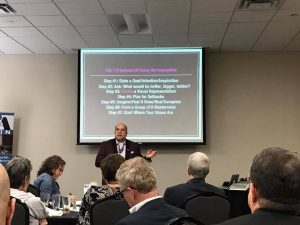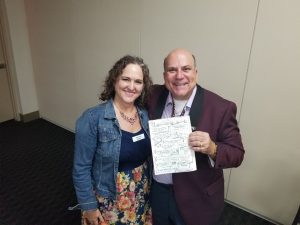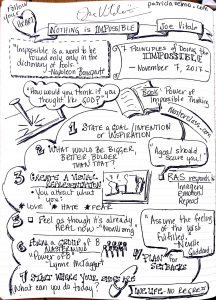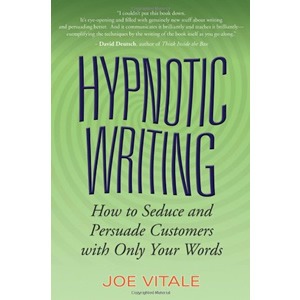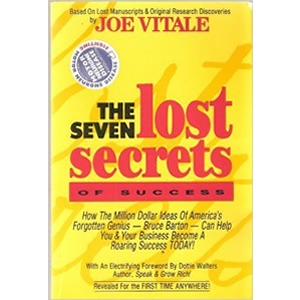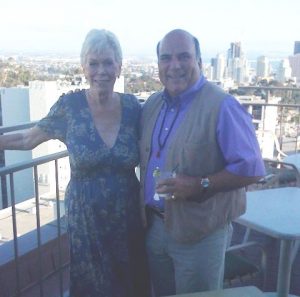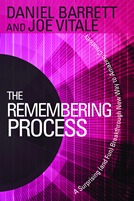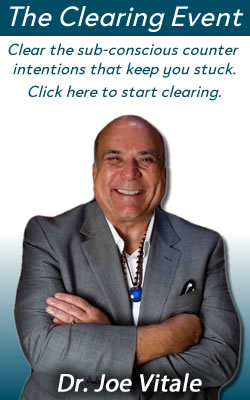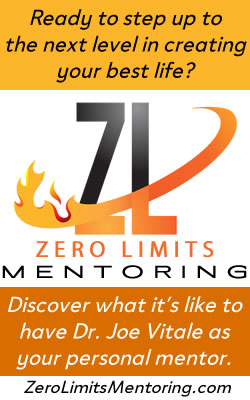Dr. Joe Vitale’s Blog
Are Critics or Criticism Valuable?
Whenever you attempt a new goal, no matter what it is, you have to be aware of critics or criticism.
I’ve had my share of them over the decades.
It used to trouble me, as I didn’t understand how some people could be so negative or hurtful.
But an insight from science helped me.
It came from my favorite science author, Loretta Graziano Breuning. Her book on cynicism, Beyond Cynical, explained that critics have a chemical that goes off in their brain when they criticize someone.
In short, they feel good about themselves because they feel superior to someone else.
This feeling of “one up” comes from a serotonin shot in their brain.
Emmet Fox, a legendary author of metaphysical books, explained, “Criticism is an indirect form of self-boasting.”
When someone puts down you or your idea, it makes him or her feel smarter than you; better than you.
Critics like that feeling.
Loretta’s book, Beyond Cynical: Transcend Your Mammalian Negativity, grabbed me as soon as I read the back cover copy:
“Cynicism feels good because it triggers the brain chemicals that make us happy. It triggers dopamine by making things seem predictable. It boosts serotonin by making you feel superior to ‘the jerks.’ It stimulates oxytocin by cementing social alliances. Cynicism relieves cortisol as you fight or flee in your mind. Negativity is natural, but you can go beyond it if you choose.”
Now criticism makes sense.
Critics spread their negativity not to help others, but to help themselves.
It’s a type of drug addiction.
Only the drug is in their brain.
In other words, critics often criticize simply to (unconsciously) make themselves feel good.
They get a chemical rush in their brain, they like it, and they want more of it.
And thus a critic is born.
But are critics or criticism helpful?
I’m not talking about professional critics.
An employed critic’s job is to review art, movies, books, food, music and such. I’m not convinced they truly help people, but that’s another article for another time.
I’m not talking about inner criticism, either.
Getting past your own “monkey mind” of self-talking negativity is part of the awakening process to achieve your goals. But that’s also for another time and another article.
I’m not talking about invited criticism, either.
Visionary giant Elon Musk of Tesla and SpaceX advises to constantly seek criticism. He says, “A well-thought-out critique of whatever you’re doing is as valuable as gold.”
What I am talking about here are the people who offer their criticism without your asking for it.
These are the people who show up and rain on your parade, before you even begin parading.
They don’t even like the idea of a parade, let alone your own parade.
And they don’t like rain, either.
How do you handle these people?
My rule of thumb is this: when you are starting a path to a goal, don’t share your dream with anyone except those who can help you attain it.
For example:
I have a ten-year-old great nephew who wants to build a car company.
Yes, a car company.
He has ideas for the make, model, name, and more. I’m in awe at his enthusiasm and creativity. I marvel at his ability to dream big, fearlessly and relentlessly. I wasn’t like that at age ten.
I was at a party with him once.
He started to share his auto design ideas with a relative.
But the relative started to bat down and criticize my great-nephew’s ideas.
“That’s been done before,” this critiquing relative told him. “None of your ideas are original.”
This same critic added, “Don’t be afraid of criticism. Welcome criticism.”
The critic’s comments were not helping my great nephew.
They were not practical suggestions.
They were not improvements or refinements.
They were dismissals.
Of course, most ideas have been done before.
The trick is to combine them and reinvent them and extend them so they become something new.
There will always be “new” cars that are “just” refinements of other cars. And some of these new cars will sell well.
So my nephew has as much a chance as anyone to create a car company that succeeds.
Besides, he’s only ten. Let him dream.
I don’t think my great nephew was swayed or stopped by the unsolicited criticism, which is a testament to the fortitude of him and youth.
In fact, when I checked on him later, he was still exuberant about making cars.
He told me, “You’re getting the first one I make, Uncle Joe. It’ll just cost you one thousand dollars for parts and stuff.” (He’s a kid. He has no idea of money yet.)
But not everyone is like that.
Even today, I keep my big goals to myself.
I don’t invite negativity.
I only invite support and input from people who might be able to help me achieve the goals.
You have to protect your dream in the early stages.
It’s much like an unborn child. You don’t want people judging you or it before it is even born.
If you are wanting to start a business, for example, I wouldn’t invite criticism.
Instead, invite people who have acknowledged success in the area of starting a new business.
Ask their advice, suggestions, and input, but not criticism.
I see uninvited critics as people who kill dreamers and dreams.
“If you have no will to change it, you have no right to criticize It.” — Mark Twain
I agree with Twain.
If you have something to offer to help a dreamer achieve their goals, then offer it.
But to condemn, criticize, complain, or any way rain on the parade, or darken a person’s sunshine, isn’t helpful. If that’s all you got, you should remain quiet.
Mark Twain also said, “Keep away from people who try to belittle your ambitions. Small people always do that, but the really great make you feel that you, too, can become great.”
My own policy is to encourage people.
“I have yet to find the man, however exalted his station, who did not do better work and put forth greater effort under a spirit of approval than under a spirit of criticism.” — Charles Schwab
Since I have no idea what the future holds, there’s no possible way for me to accurately predict if any idea will work or not.
So if I see or hear of someone pursuing a dream, I cheer him or her on.
I got the nickname “Mr. Fire” decades ago for this trait of always “lighting a fire” under people to go for their dreams.
Besides, encouraging people lights up my brain.
It’s my brain drug.
It feels good to help, to serve, to encourage.
Goethe said, “Correction does much, but encouragement does more.”
I’ve found being encouraged a type of fuel for my success.
Actor Kevin Bacon said, “A good director creates an environment, which gives the actor the encouragement to fly.”
When I was filming my first acting role, the director (Liz Tabish) made me feel safe and encouraged me.
As a result, my first starring role in an indie movie was easy and fun.
And according to the early reviews of Cecilia, I did pretty well, too.
In the end, you have to follow your dreams to feel fully alive, despite encouragement or criticism.
Of course, at some point you have to complete your project and release it to the world.
And that’s when you can expect critics and criticism.
When I was recording my first album back in 2012, a musician friend warned me, “Gird your loins! When you release your music, everyone will slam it. Just remember there are people who don’t like the Beatles, and I think they were gods.”
A friend of mine once said that “success breeds contempt.”
It helps explain why so many of my friends turned against me when my levels of success started to escalate beyond the sky.
It stirred the critics.
My point here is to keep your plans to yourself until they are complete.
And after that, remind yourself that there will always be critics.
“Do what you feel in your heart to be right–for you’ll be criticized anyway. You’ll be damned if you do, and damned if you don’t.” — Eleanor Roosevelt
Life is really about pursuing your own passions and purpose, despite the odds and the critics.
Whatever your goal, whether to attract money or health or a relationship or some big audacious dream, there will always be people who will say you can’t do it, or explain why it won’t work.
“Any fool can criticize, complain, and condemn–and most fools do. But it takes character and self-control to be understanding and forgiving.” — Dale Carnegie
Just remember that critics are drug addicts.
They get high on putting down others.
So understand them and forgive them.
And also realize there are always people who will cheer you on, believe in you, support you and encourage you.
“The key is to keep company only with people who uplift you, whose presence calls forth your best.” ~ Epictetus
Look for those cheerleaders in your life.
Surround yourself with them.
And let the critics criticize and complain.
Stay too busy going for your dreams to even notice them.
To quote author Elbert Hubbard, “The final proof of greatness lies in being able to endure criticism without resentment.”
‘Nuff said.
Ao Akua,
PS – You can find clarity and support in my Miracles Coaching program.
Doing the Impossible
The other day I revealed “7 Steps to Doing the Impossible” at the Austin chapter of the National Speakers Association.
While no one recorded it (big mistake on my part), I thought you might like to see these photos and this mind-map.
The note-map was made on the spot, as I spoke, by attendee Patricia Selmo. She was kind enough to let me share it here with you.
With her notes, and your mind, you ought to be able to figure out the seven steps. Eventually they’ll be in a book I’m writing on “Anything Is Possible.” Enjoy.
Law of Attraction Quotes
I love Law of Attraction quotes, inspiring and motivational quotes, and just any quotes that make me think.
Some of my favorite quotes include –
“Be the change that you wish to see in the world.” – Gandhi
“Darkness cannot drive out darkness: only light can do that. Hate cannot drive out hate; only love can do that.” – Martin Luther King, Jr.
“Amateurs sit and wait for inspiration, the rest of us just get up and go to work.” – Stephen King
“There are only two ways to live your life. One is as though nothing is a miracle. The other is as though everything is a miracle.” – Einstein
But I never thought people would be quoting me so much over the last thirty years that my quotes would end up in a book.
Well, meet Dr. Joe Vitale’s Greatest Law of Attraction Quotes.
This new book contains more Law of Attraction and related quotes than I want to count. Some of these have been tweeted and retweeted numerous times all over the Internet.
Some of the most popular are:
A goal should scare you a little, and excite you a lot.
We live in a belief-driven Universe. Change your beliefs and you change your Universe.
Your wealth is hiding under the very thing you are afraid to do.
Whatever you say after “I am” defines who you become.
The Universe loves speed.
Of course, when you keep working on yourself, you keep growing. As a result, some of my quotes from my early years seem like contradictions to quotes from more recent years.
They don’t contradict; they compliment.
They are simply spoken from different “grades” of life.
Early on I said –
Intentions rule the Earth. It causes the Universe to rearrange everything and everyone around you to help you fulfill your intentions.
But more recently I’ve said –
Intention is not as important as inspiration. Intention is a toy of the mind; inspiration is a directive from the Divine.
Of course, both quotes are true.
The most relevant one to you will depend on what level of consciousness you are currently on.
My staff had fun collecting these quotes from my books, recordings, and speeches. After they compiled them all, they split them into groups, by topic, so you could easily find quotes when you needed them.
But another way to use this book is called bibliotherapy.
In short, open the book anywhere and let the quote your eye lands on be your guiding thought for the day.
I’ll open the book anywhere right now and quote what I see:
Passion is the ticket to success. Follow your passion and you’re on the road that’s right for you.
That quote works for me.
Or, another way you can practice bibliotherapy is, hold a question in mind, and then open the book anywhere. Wherever your eye seems drawn to a quote on the page you opened to, treat it as a message from the Universe and meditate on it.
You are making the book a sort of oracle.
For example, I’m going to be recording some video lessons later today for a new product. What might be something I can do to make the videos the best I can make?
I open the book at random and see –
It’s not the thing you want. It’s the feeling that it gives you.
That answer seems to tell me that instead of focusing on an end result with the video I’ll record, focus on how I want to feel when the video is recorded.
That’s smart and useful advice, even if I am quoting myself.
For the fun of it, here are a few more quotes from the book, taken at random:
You can attract what you want faster if you don’t need it.
Your perception creates your reality. You can look at life and see scarcity or abundance. It depends on your mindset.
The new secret to manifesting your goals is to: Have fun. Keep smiling. Be playful. Stay grateful.
This Law of Attraction quote book might make a good holiday gift for family and friends since, after all, the holidays are coming up and you’ll need something to give. 🙂
In fact, here’s a quote on giving from my book:
When you give anything, you tap into a higher spiritual law. You have little to do but give, wait, and receive.
And you can quote me on that.
Ao Akua,
PS – Dr. Joe Vitale’s Greatest Law of Attraction Quotes is available in paperback or for any Kindle reader. Just go to https://smile.amazon.com/Greatest-Law-Attraction-Quotes-Vitale-ebook/dp/B075VMFRLN/
Hypnotic Stories
I’ve been writing about hypnotic stories since the 1990s.
My first e-book, Hypnotic Writing, described them.
I created Hypnotic Writing out of two passions of mine in the 1980s and 1990s: literature and copywriting.
Jack London, Mark Twain, William Saroyan and other great story telling authors fascinated me.
But so did great copywriters like Robert Collier, Bruce Barton, and John Caples.
After speculating on how each wrote their stories, I developed Hypnotic Writing as a way to explain it and teach it.
In short, I combined both styles of writing to create a third style.
I’ve written about this in many of my other early marketing books, including Buying Trances.
Of course, my book on P.T. Barnum, There’s A Customer Born Every Minute, is packed with hypnotic stories.
But I just discovered even more proof that hypnotic stories increase sales, influence, and more.
Let me explain:
I came across a project called Significant Objects.
The idea behind Significant Objects was to create a scientific study to see whether creative stories about mediocre objects could persuade people to buy near worthless stuff.
In other words, the authors would take a simple object that you might find at a garage sale for one dollar.
Then they would write a fictional story about it.
And then they would list the item, with the story, on eBay.
Surprisingly (or not), the item sold for many times its original price.
They did this for 100 objects.
The results were astonishing.
Objects that originally sold for around one dollar, were each placed on eBay with an accompanying made-up story.
The story triggered sales.
Those meaningless objects, now given meaning, sold for thousands of dollars in total.
For example, a Missouri shot glass, which looked like trash to me and originally sold for $1, had a fictional story written about it.
The story and photo were put on eBay.
That shot glass then sold for $76.
That’s a $75 profit from a hypnotic story.
That’s the power of a story.
The point being, the stories did the selling.
Of course, I’m not at all advising you to write fictional stories about your product or service.
But you have stories.
True stories.
They are from you (how you began your business or why) or from your customers (testimonials from satisfied people).
It’s those hypnotic stories that can increase your sales and influence.
In my book, The Seven Lost Secrets of Success, I advised revealing “the business nobody knows.”
In other words, tell the story behind you, your product, your service, and/or employee.
Your hypnotic stories will bring your business to life.
There’s a site you can visit http://significantobjects.com/ that fully describes the Significant Objects study, and their stories. It’s worth a look.
Their site opens saying, “Significant Objects, a literary and anthropological experiment devised by Rob Walker and Joshua Glenn, demonstrated that the effect of narrative on any given object’s subjective value can be measured objectively.”
Meanwhile, what’s your hypnotic story?
Ao Akua,
PS – My newest book is out this week: Dr. Joe Vitale’s “Greatest Law of Attraction Quotes.” You can find the printed and Kindle versions at Amazon. Open the book anywhere and see what “hypnotic story” begins for you. 🙂 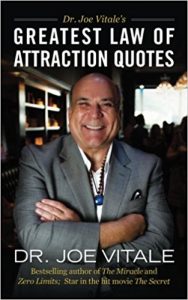
Loving Louise Hay
Self-help legend Louise Hay passed away the other day, on the morning of August 30, 2017.
She was 90, and made the transition peacefully in her sleep, at her home.
She influenced millions with her books, including me.
One of the highlights of my life was having dinner with her about ten years ago.
She openly shared her life, mission, and home with me.
She said, “The more people you help, the better your life will be.”
Her first book, Heal Your Body, was privately published by her in 1976 – when she was 50 years old.
That “little blue book” went on to become a self-help classic.
She bought me dinner and we talked about everything from The Secret movie to Jerry and Esther Hicks and Abraham to Operation YES, my movement to end homelessness.
She showed interest in my life and work.
She asked questions.
She listened.
Back in her San Diego home, she gave me so many signed copies of her books that I began to feel uncomfortable.
“What’s wrong?” she asked. “Do you have a problem receiving?”
I got over it.
I opened my arms to receive more.
She was loving and lovable.
She was warm and wise.
She will live forever in her books and through her company, Hay House.
I am forever grateful to her, and will always miss her.
Thank you, Louise.
I love you.
Ao Akua,
PS – A few years ago Louise Hay’s company published the book I coauthored with Daniel Barrett, The Remembering Process, which remains a milestone in my career.
Watch Louise Hay in action here:

